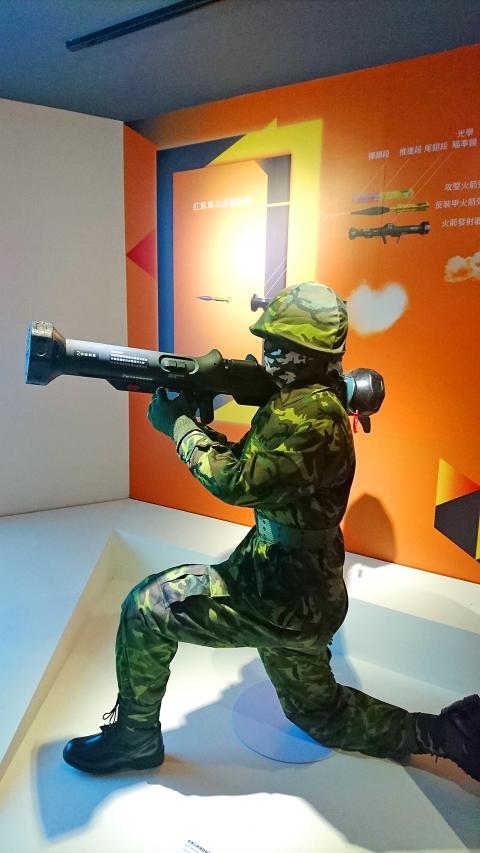The Military Police Command plans to buy 445 indigenously designed Kestrel missile launchers to defend the capital against assaults by China’s People’s Liberation Army (PLA), sources said on Monday.
Purchases would be spread over two years from next year and the missile launchers would be issued to military police units garrisoned in the Taipei metropolitan area, especially those guarding the Boai Special District (博愛特區), which is home to several ministries and other government buildings, they said.
The Kestrel missile launcher is a disposable, single-shot, shoulder-launched weapon system that fires either a high-explosive anti-tank warhead to engage vehicles with light to medium armor, or a high-explosive squash head to use against buildings.

Photo: Lo Tien-pin, Taipei Times
Thus far, the version of the weapon developed by the Chungshan Institute of Science and Technology has only been issued to the marine corps.
The purchase would enable military police to better defend Taipei against decapitation strikes, such as airborne, airmobile or special operations assaults, by the PLA, a defense official said on condition of anonymity.
With the missile launchers, the military police could launch mobile counterattacks in urban combat and retake crucial governmental structures, the official said.
The lightweight weapons could be deployed in high-rises or transported in vehicles, making them difficult to counter in an urban environment, the official added.
To bolster the capital’s defenses, the military has garrisoned an additional marine battalion at the Fuxinggang (復興崗) military base in Taipei and formed the Quick-Reaction Company at the 202nd Military Police Regional Command, the official said.
Asked to comment, the Military Police Command confirmed that it plans to buy the Kestrel missile launchers to defend Taipei.
Anti-armor weapons could engage various hostile vehicles and high-value targets, disrupt tactical formations, sap morale, delay troop movements and shatter the enemy’s will to fight, the command said.

A preclearance service to facilitate entry for people traveling to select airports in Japan would be available from Thursday next week to Feb. 25 at Taiwan Taoyuan International Airport, Taoyuan International Airport Corp (TIAC) said on Tuesday. The service was first made available to Taiwanese travelers throughout the winter vacation of 2024 and during the Lunar New Year holiday. In addition to flights to the Japanese cities of Hakodate, Asahikawa, Akita, Sendai, Niigata, Okayama, Takamatsu, Kumamoto and Kagoshima, the service would be available to travelers to Kobe and Oita. The service can be accessed by passengers of 15 flight routes operated by

MORE FALL: An investigation into one of Xi’s key cronies, part of a broader ‘anti-corruption’ drive, indicates that he might have a deep distrust in the military, an expert said China’s latest military purge underscores systemic risks in its shift from collective leadership to sole rule under Chinese President Xi Jinping (習近平), and could disrupt its chain of command and military capabilities, a national security official said yesterday. If decisionmaking within the Chinese Communist Party has become “irrational” under one-man rule, the Taiwan Strait and the regional situation must be approached with extreme caution, given unforeseen risks, they added. The anonymous official made the remarks as China’s Central Military Commission Vice Chairman Zhang Youxia (張又俠) and Joint Staff Department Chief of Staff Liu Zhenli (劉振立) were reportedly being investigated for suspected “serious

ENHANCING EFFICIENCY: The apron can accommodate 16 airplanes overnight at Taoyuan airport while work on the third runway continues, the transport minister said A new temporary overnight parking apron at Taiwan Taoyuan International Airport is to start operating on Friday next week to boost operational efficiency while the third runway is being constructed, the Ministry of Transportation and Communications said yesterday. The apron — one of the crucial projects in the construction of the third runway — can accommodate 16 aircraft overnight at the nation’s largest international airport, Minister of Transportation and Communications Chen Shih-kai (陳世凱) told reporters while inspecting the new facility yesterday morning. Aside from providing the airport operator with greater flexibility in aircraft parking during the third runway construction,

Taiwanese and US defense groups are collaborating to introduce deployable, semi-autonomous manufacturing systems for drones and components in a boost to the nation’s supply chain resilience. Taiwan’s G-Tech Optroelectronics Corp subsidiary GTOC and the US’ Aerkomm Inc on Friday announced an agreement with fellow US-based Firestorm Lab to adopt the latter’s xCell, a technology featuring 3D printers fitted in 6.1m container units. The systems enable aerial platforms and parts to be produced in high volumes from dispersed nodes capable of rapid redeployment, to minimize the risk of enemy strikes and to meet field requirements, they said. Firestorm chief technology officer Ian Muceus said